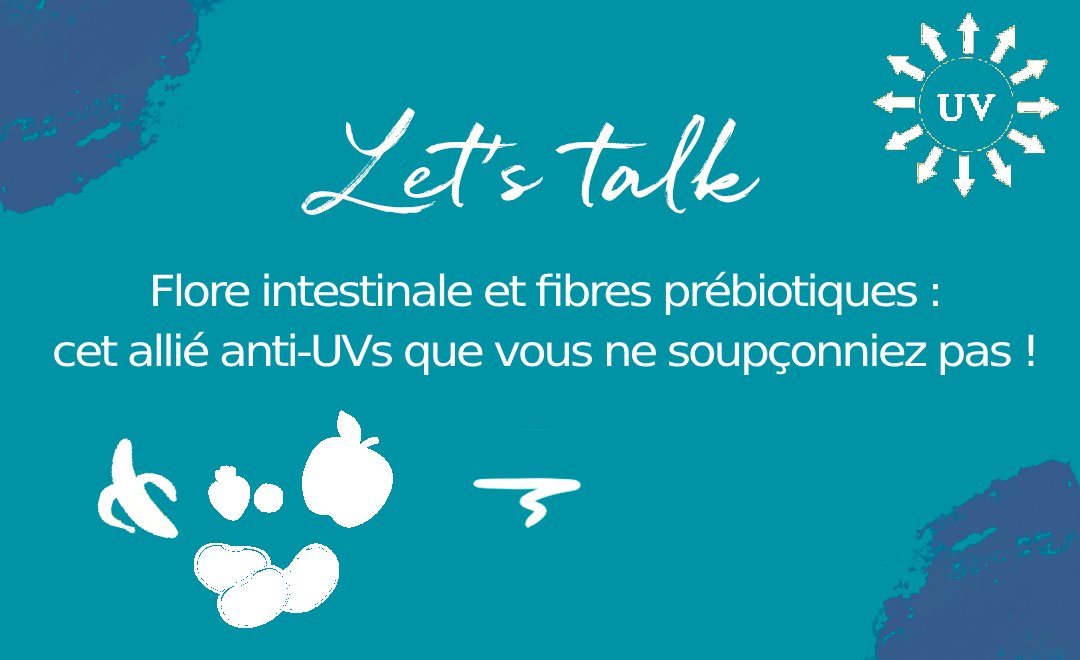If some people love cereal bars or energy drinks, it might not be just because they like the taste. Recent studies tend to show that the importance of the intestinal flora is largely underestimated. Furthermore, this perception is expanding day by day and we have recently realized that its spectrum of action is extremely vast. The most surprising thing is that your intestinal microbiome is involved in repairing skin damage caused by the sun's UV rays. Is this really possible? If so, do we know the mechanisms? Finally, are there food supplements capable of helping you protect your skin by influencing the well-being of your flora? Yes, yes and yes: the MyPureSkin team helps you better understand your skin and your body to make a choice that will do you good.
The intestinal microbiome: an inner life that is daily ignored
Often underestimated, the role of the intestinal flora in the immune system appears to the general public to be largely secondary, or even completely anecdotal. However, this represents the first barrier against pathogens potentially present in the food we ingest. In a study published by Yasmine Belkaid and Timothy Hand in 2014 (1), we find what makes this batch of intestinal bacteria a very effective immune “firewall”, that is to say an interdependent relationship between three elements keys:
- Diet;
- The state of the intestinal mibrobiota;
- The level and type of immunity.
From the conclusions of this study, a key idea should be retained: our diet is the starting point of our health.
Tastes and colors, it is discussed !
Far from the adage that tastes are unique to each person and reflect the individual's own will, the reality would be quite different. Just as training young minds requires an appropriate approach, food education has regained importance in recent years within families, as a reaction to decades of almost generalized fast food. This approach is all the more relevant since certain studies show that the intestinal flora influences our tastes and what we want to eat. Thus, through the research of Joe Alcock and his collaborators, published in 2014 (2), we discover, among other things, that:
- The bacteria of the intestinal flora produce molecules that act like hormones on the human body;
- Probiotic type bacteria (certain lactobacilli in particular) are capable of improving the body's sensitivity to insulin as well as glucose tolerance and contributing to a greater reduction in fat mass;
- Certain bacteria impact our weight control abilities, increasing our risk of being overweight, compared to other individuals with different intestinal flora;
- The quality of the microbiota (combining usefulness, quantity and diversity of bacteria) can increase drastically in just 24 hours following the food bolus, but its long-term sustainability requires specific nutrition.
From these discoveries, we can therefore mainly remember that:
- The intestinal microbiota influences both our choices and various functions of our body essential to maintaining our health;
- It is possible to influence our microbiota in a very short time through diet, but it takes time to maintain the results obtained.
From intestinal microbiota to the skin: why consume prebiotics?
This improvement in our intestinal microbiome goes through diet of course. It's about feeding our “good” bacteria to keep them healthy and in sufficient numbers to help keep us in good shape. This “form” should be taken in the broad sense, since the microbiota goes so far as to affect the condition of our skin!
Relationships between our intestinal flora and our skin health
In the conclusions of an article published in 2022 following the work of Rayhan Mahmud and his team (3), we understand that the messenger molecules mentioned above (acting like hormones) regulate the behavior of the skin in different respects, in particular:
- Its immune function (the protection of the skin against attacks from external pathogens such as viruses and bacteria depends on it);
- Several of its metabolic functions (the production of sebum, for example, can increase drastically to the point of creating acne when consuming certain derivatives of dairy products such as ice cream).
The relationships between intestinal flora and skin are a still unexplored subject and, as Mahmud points out, current research will allow us to better understand the “intestino-cutaneous” axis in the future. However, we now sufficiently understand certain aspects of the immune and metabolic impact of the intestinal flora on the skin to design solutions aimed at improving the condition of the skin in the face of certain attacks from the environment.
The sun: between necessity and danger for the skin
In the middle of summer, sunbathing is always enjoyable. Unfortunately, prolonged and unprotected exposure has increasingly serious consequences with age. Indeed, the aging process is accompanied by a reduction in “youth molecules” (collagen, elastin and hyaluronic acid). Worse still: our ability to regenerate skin cells diminishes over time, so that we have to protect ourselves more and more. If the sun is necessary to fix the vitamin D that we consume through our diet, its UV rays tend to burn our skin and mutate our cells, increasing the risk of cancer. Furthermore, the quality of the skin itself suffers since UV rays cause the degradation of molecules in the plasma membrane of our skin cells, which leads to the appearance of free radicals in the body. In too large quantities, these free radicals can no longer be processed by our natural neutralization mechanisms, which creates a phenomenon called “oxidative stress”. This is a factor of premature aging well known to the anti-aging industry and this is why adequate protection (sun cream and appropriate clothing) and a diet adapted over time (consumption of ingredients containing antioxidants such as vitamin C) are the two best shields for your skin.
Neutralize oxidative stress upstream and... repair the skin downstream!
However, these preventive measures are not always enough and the discoveries mentioned above have laid the foundations for the creation of food supplements capable of placing themselves upstream and downstream of the danger of UV rays for your skin. Based on studies such as the one published in 2019 by Alesa Dalal's team (4), certain nutricosmetics such as MyCollagenGlow take advantage of the properties of prebiotics such as galacto-oligosaccharides, which nourish your intestinal flora. Capable of boosting it, prebiotic fibers cannot be processed by your digestive system and therefore only serve your microbiome. In doing so, it becomes capable of producing signal molecules making it possible to limit the triggering of inflammatory reactions linked to external factors. Psoriasis, dermatitis and other skin diseases can thus be mitigated and skin damage can be repaired more quickly and more effectively by your body.
MyCollagenGlow: when your diet boosts your skin health
With an intimate understanding of skin regeneration mechanisms, MyPureSkin has developed MyCollagenGlow, an anti-aging food supplement whose broad spectrum of action targets your skin directly and indirectly by:
- Nourishing her from within;
- Helping to protect it from sources of premature aging;
- Helping to repair damage caused by oxidative stress and other pathogens.
To do this, MyCollagenGlow consists of:
- Biotin (vitamin B8), whose concomitant action with that of other active ingredients stimulates the production of keratin by your body and increases the growth rate of hair follicles
- Zinc whose role in maintaining the quality of your hair has been highlighted by numerous studies;
- A complex of vitamins B5, B6 and B12 whose synergistic integration with biotin significantly increases the results that vitamin B8 alone can offer;
- Marine collagen peptides with very high bioavailability;
- Galacto-oligosaccharides, one of the key roles of which is the maintenance of a key element of your immune system: your intestinal flora (much more important than we think in the maintenance of the scalp);
- Hyaluronic acid whose colossal storage capacity allows it to carry nearly 1000 times its weight in water (in order to guarantee your body excellent hydration);
- Vitamin E whose anti-oxidant action helps protect your cells from oxidative stress (and therefore premature aging);
- Beta-carotene, precursor of vitamin A, whose benefits extend from the ability to maintain clear vision to the preservation of cognitive functions and, of course, the quality of the scalp (by helping to preserve your cells from oxidative stress).
So, are you ready to try a first course of MyCollagenGlow based on biotin? Take care of your hair, nails and skin today by making the right choice: targeted nutrition that puts your hair health in the spotlight.
- Study by Yasmine Belkaid and Timothy Hand on the importance of the role of the gut microbiome in immune function: https://www.ncbi.nlm.nih.gov/pmc/articles/PMC4056765/
- Research published in 2014 by Joe Alcock's team exploring the influence of gut flora on food choices: https://www.ncbi.nlm.nih.gov/pmc/articles/PMC4270213/
- Research by Rayhan Mahmud and his team looking at the impact of the gut microbiome on skin health: https://www.ncbi.nlm.nih.gov/pmc/articles/PMC9311318/
- Study investigating the role of the gut microbiome in the pathogenesis of psoriasis and the therapeutic effects of probiotics: https://journals.lww.com/jfmpc/Fulltext/2019/08110/The_role_of_gut_microbiome_in_the_pathogenesis_of.9.aspx?WT.mc_id=HPxADx20100319xMP





Share:
MyCollagenRepair: a nutricosmetic on the border of well-being and sport
MyCollagenLift, optimized anti-aging nutrition: when science goes beyond traditional nutrition